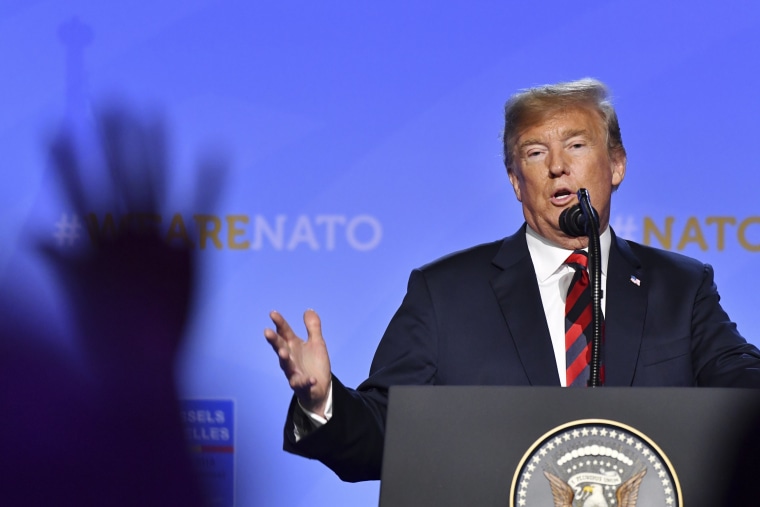Earlier this week, at a brief press conference alongside Italian Prime Minister Giuseppe Conte, Donald Trump seemed oddly eager to blast NATO, insisting that the military alliance "was essentially going out of business," adding, "It was going down, down, down." None of what the American president said was true. He didn't appear to care.
A week earlier, Trump made a series of false claims about NATO during remarks to steelworkers in Illinois, where he complained bitterly about the alliance at a speech that wasn't supposed to have anything to do with foreign policy. Two weeks before that, the Republican president questioned the value of the NATO alliance's core principles during a Fox News interview.
Under the circumstances, it's easy to imagine the United States' allies questioning our commitment to NATO, given Trump's overt and difficult-to-understand hostility toward the successful international partnership. As the Associated Press reported, a bipartisan group of senators hosted a private meeting yesterday "to reassure diplomats from NATO and other European nations of the Senate's support for the alliance."
Sen. Richard Durbin, D-Ill., who helped initiate the meeting, said lawmakers wanted to "reassure these countries of our commitment to NATO and our commitment to their security." [...]Participants said the meeting involved around 20 senators plus ambassadors and other representatives from around nine nations. That included diplomats from Ukraine, Latvia, Poland, Norway, Finland and NATO's newest member, Montenegro.
I suspect the gathering was at least somewhat reassuring, but we're again faced with a difficult foreign policy dynamic in which our allies no longer know whom to listen to: the American president or American officials who keep downplaying the relevance of our amateur president's strange antics.
Indeed, this isn't at all new. Over the course of last months's NATO summit, Trump managed to offend and frighten many key allies of the United States, leaving foreign leaders convinced that he’s not a “very stable genius,” his latest claims to the contrary notwithstanding.
After the American president departed Brussels, it fell to others to help clean up Trump’s latest mess. NBC News reported that U.S. military leaders, directed by Pentagon leaders "embarked on a full-scale 'damage control' operation with calls to their counterparts across Europe to reassure them that America will abide by its defense commitments in the region.
As we discussed at the time, the message from U.S. officials to our international partners was effectively, “Don’t pay too much attention to what the Leader of the Free World has to say" -- which was probably very much in line with what senators told foreign diplomats yesterday.
Something similar happened earlier this year. Remember this Washington Post report from February?
Amid global anxiety about President Trump’s approach to world affairs, U.S. officials had a message for a gathering of Europe’s foreign policy elite this weekend: Pay no attention to the man tweeting behind the curtain.U.S. lawmakers – both Democrats and Republicans – and top national security officials in the Trump administration offered the same advice publicly and privately, often clashing with Trump’s Twitter stream:
New York’s Jon Chait added last summer, “It is humiliating for the world’s greatest superpower to disregard its president as a weird old man who wanders in front of microphones spouting off unpredictably and without consequence.”
That’s true, of course, but there are practical considerations, as well. The more U.S. officials scramble into “damage control” mode in the wake of Trump tantrums, the more people abroad are led to believe the position of the United States on key issues isn’t necessarily what the president of the United States says it is.
The result, predictably, is widespread confusion – which is no way for a global superpower to conduct its foreign policy.
